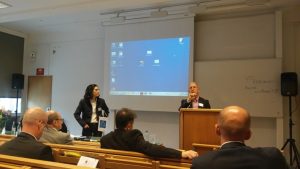Retail crime: International evidence and prevention, 15th September 2016
Retail crime: International evidence and prevention, 15th September 2016
Place: Room L1, Drottning Kristinas väg 30, Kungliga Tekniska Högskolan (KTH)
Swedish stores are targeted by 2 million shoplifting cases each year, for a value of SEK 4.6 billion; only 2 percent of these crimes are reported to the police. Food trade has the highest number of thefts, followed by clothing and shoes, electronics and liquor store products. This pattern is also evident in the UK and the US. According to the British Retail Consortium’s crime survey, the annual bill for retail crime in the UK broke through £600m in 2014, electrical goods, designer clothes, power tools, alcohol and cosmetics constitute the most common types of stolen products (The Guardian, 2015). Shoplifting from retail stores costs merchants an estimated loss of 13 billion dollars per year. While shoplifting is the biggest cause of all retail shrink in 16 of the 24 countries surveyed by the Global Retail Theft Barometer, in the United States, employee theft ranked first at 43 per cent, with shoplifting next at 34 percent.
Many of these stores are located within shopping malls (centres, outlets). Sweden, has for instance, approximately 300 shopping centres, double that of ten years ago. For many of us ‘going shopping’ is perceived to be an activity filled with great pleasure (Bamfield, 2012) as shopping centres have evolved from a group of stores to large enclosed malls with an eclectic number of services and functions. Whilst these shopping centres service a variety of social functions, the majority also share common vulnerabilities – such as parking lots and other design risks. In a parallel development in the last decades, we have witnessed also the formation of criminal constellations devoted to retail and cargo crime that involve criminal organisations often beyond national borders and even continents (e.g., Burges, 2013). These activities take a variety of forms including thefts from stores, fraudulent papers, cargo thefts, and corruption – in other words, a gamma of organized criminal activities that may be intertwined with legal ones.
Our goal with this international seminar is to characterise the dynamics of crimes typical in retail and shopping centres. The seminar will provide both theoretical and practical perspectives on current crime prevention activities directed to crimes that most affect stores, retailers, shopping malls and commercial conglomerations located both within the inner cities and on the outskirts of towns and cities. As such, this event appeals for both both academics and practitioners from a variety of disciplines and backgrounds.
The seminar offers state-of-the-art research and crime prevention practices on retail from, for example, Europe, the UK, the USA, Central America, South America and Australia.
Confirmed Speakers (selected)
- Prof Rachel Armitage, Secure Societies Institute, Huddersfield University, UK
- Prof David Weisburd, George Mason University, USA & Hebrew University of Jerusalem, Israel
- Prof Ernesto Savona, Director of TRANSCRIME, Università Cattolica, Milan, Italy
- Mariano Bustamante, Security manager, Walmart, Mexico
- Svante Dahlin, Security manager, El Giganten, Sweden
- Per Sandberg,Head of security, Kista Galleria/Shopping center, Sweden
- Prof Joshua Bamfield, Director, Centre for Retail Research, UK
- Doctor Paul Cozens, Department of Planning and Geography, Curtin University, Australia
- Doctor Marcelo Justus, Institute of Economics, University of Campinas, Brazil
- Doctor James Hunter, School of Social Sciences, Nottingham Trent University, UK
- Doctor Brian T. Smith, University of New Haven, USA
- Prof Väino K Tarandi, School of Architecture and the Built Environment, KTH, Sweden
HOW TO PARTICIPATE?
Are you interested in participating? Send an email to vania.ceccato@abe.kth.se.
The seminar is free of charge but registration is binding. Limited places.
This event is sponsored by The Swedish Retail and Wholesale Council (Handelsrådet) & The British Society of Criminology (BSC).











